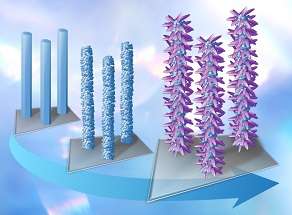Designing bespoke nanomaterials for energy applications

anomaterials have the potential to play a central role in solving many of today's biggest sustainability issues, whether it's developing more efficient renewable energy technologies, removing pollutants from the air and water, or even in the treatment of diseases. Key to the success of nanomaterials in these areas is the development of scalable production methods that can precisely control the properties of these materials.
CSCT student, David Miles has published a paper that demonstrates the rapid and scalable production of Zinc Oxide nanomaterials using a technique called electrochemical anodization. The technique can be controlled to give rise to a wide range of interesting structures, with different sizes and shapes, which can be tailored towards specific applications.
Working with Dr Davide Mattia, Dr Petra Cameron and collaborators at Yonsei University, David is currently applying these nanomaterials within photovoltaic cells where their unique properties can be used to enhance the efficiency of these devices.
More information: "Hierarchical 3D ZnO nanowire structures via fast anodization of zinc." J. Mater. Chem. A, 2015,3, 17569-17577 DOI: 10.1039/C5TA03578C
Journal information: Journal of Materials Chemistry A
Provided by University of Bath




















